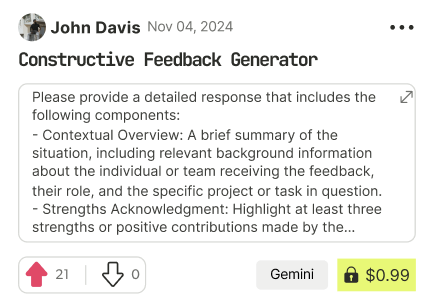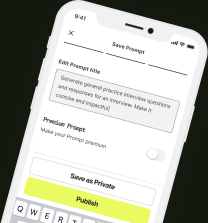prompt mine App
Find, Create & Share AI Magic
Navigating Relationship Conflicts with Empathy and Communication
Okay, I understand. Let's break down this conflict and create a plan for resolution.
**Please fill in the bracketed information so I can give you specific and helpful advice.**
* **The issue causing tension:** [Be as specific as possible. For example, "Chores around the house," "Spending habits," "Communication frequency when apart," "How we discipline our children," etc.]
* **My perspective:** [Clearly explain your side of the conflict, including your feelings and needs. For example, "I feel overwhelmed because I'm doing most of the housework. I need you to contribute more so I can have some time to relax and pursue my hobbies."]
* **Their perspective:** [Summarize your understanding of their viewpoint and concerns. For example, "I think they feel like they are already working hard and don't have much free time either. They may also feel like I'm criticizing them and not appreciating their efforts."]
* **Relationship history:** [Briefly describe the overall state of your relationship. For example, "We usually communicate well, but this issue keeps coming up," or "We've been struggling lately with a lot of stress due to work and finances."]
* **Desired outcome:** [State what you hope to achieve. For example, "Resolve the conflict peacefully," "Improve our communication," "Find a compromise where we both feel heard and understood," "Re-establish trust," etc.]
**Once you provide that information, I will offer tailored advice on:**
* **Empathetic Listening Techniques:**
* **Communication Strategies:**
* **Conflict Resolution Techniques:**
* **Actionable Steps:**
I'm here to help you navigate this situation. The more details you provide, the better I can assist you in achieving a positive outcome.

Navigating Relationship Conflicts with Empathy and Communication


Find Powerful AI Prompts
Discover, create, and customize prompts with different models, from ChatGPT to Gemini in seconds

Simple Yet Powerful
Start with an idea and use expert prompts to bring your vision to life!